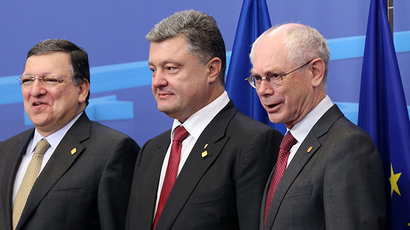New York Times admits Ukraine’s Yanukovich was right not to sign EU deal
Bryan MacDonald is an Irish journalist, who is based in Russia via RT.com

Three years after the event, the establishment media is finally issuing mea culpas for its self-interested support of 'Euromaidan,' the Western-backed ‘regime change’ crusade which destroyed Ukraine.
I was wondering how long this would take. But now that it’s happened let's raise a Christmas glass to the New York Times and its reporter, Andrew Kramer. Because they’ve finally admitted that those of us who opposed Kiev’s ‘Euromaidan’ movement were right. Furthermore, America’s ‘newspaper of record’ has acknowledged how, despite its own fervent encouragement of the violent coup, former President Victor Yanukovich was correct not to sign a tightfisted free trade deal with the European Union.
The NYT uses the collapse of Ukraine’s once lucrative agriculture industry to illustrate its climbdown. Especially the poultry business, which due to miserly EU quotas, and the loss of the Russian market, has been decimated.
“The sector accounts for about 40 percent of Ukraine’s exports. But tariff-free quotas for most agricultural products, under the trade deal, are tiny,” Kramer writes.
“Allocations for honey, for example, were so low that they were filled in the first six weeks of the year. Quotas to export eggs to the Europe Union equate to around 1.5 percent of just (one single company) Avangard's annual output, let alone that of the entire sector.”
The ‘Gray Lady’ admits how “the deal provided a double blow to the agriculture sector: It went far enough to enrage Russia, but stopped short of immediately opening a lucrative new market.”
Waking up
Accepting that the EU arrangement is bad business also kiboshes the long-held NYT narrative where Yanukovich served as Moscow’s “pro-Russian” placeholder. The fact he negotiated with Brussels until the very last moment before rejecting their association agreement, has always countered this lazy supposition anyway. Yet, the simple black and white truth is that Russia offered better terms. A $15 billion loan and gas discounts, plus continued access to an economy which Kiev was already heavily integrated with.
However, back in late 2013, if you warned how the EU pact wasn’t a clever idea for Ukraine, you were called a “useful idiot” or a “Russian stooge.” This was despite the fact that such a position was the only logical analysis of the situation. There has never been a country in world history which wrecked relations with its main, nation-state, trading partner and immediately prospered from it.
Also, the EU accord wasn't quite what it was cracked up to be. Despite all its idealistic talk, Brussels insisted upon stingy quotas on Kiev's exports and offered no guarantee Ukrainians would promptly receive even visa-free travel from Schengen states. Indeed, more than three years on, and having bent over backward for Eurocrats, they still can’t freely enter the bloc.
As I wrote at the time: “According to statistics the benefits of acceding to the Free Trade regime amount to €490 million per annum. However, if President Putin decided to pull the plug on Ukrainian access to his market (which, ironically, Poroshenko partially later did in a sort of petulant suicide), the loss of the Russian and Belarusian outlets would amount to €16 billion annually.” Hence, the idea that Yanukovich worked in concert with the Kremlin was always preposterous. On the contrary, many Russian officials disliked him because they felt he played them off against Brussels for too long.
False promise
Of course, it was a fallacy to suggest how Ukraine’s standards of living and economic well-being could swiftly improve through ties with the EU. On the contrary, honest analysts could clearly see that even if it had been suddenly offered rapid full membership, Ukraine would go into a tailspin. Because its industry and workforce aren't competitive and haven’t kept up technologically during the last 20 to 30 years. Not to mention how its education system is a shambles, where professorships are usually purchased, and it’s almost impossible to graduate without greasing a palm or a dozen. Thus, it's impossible to be sure if younger Ukrainians are qualified to the extent their parchments imply.
Kramer’s piece highlights the economic emergency in Ukraine right now. He quotes Oleg Bakhmatyuk, owner of the aforementioned ‘Avangard:’ “We need capital investment and trade investment,” he said.
“There’s no liquidity. We are losing our export market. As an agricultural territory, we are moving backward.”
And it's not just agriculture. Heavy industry has been choked by obstructions on cooperation with its natural Russian partners. For instance, Antonov, the iconic airplane manufacturer, found itself declared bankrupt earlier this year. This was especially sad considering Ukraine had been an aviation superpower in its own right, punching way above its size
Meanwhile, Kramer also cites some positives from the EU relationship. Such as how the western edge (around fanatically pro-Brussels Lvov) has benefited from some investment and “niches like a ski manufacturing industry have done well.” That said, no country has ever been built on making skiing gear. And to even attempt such a thing would be the start of a slippery slope.
By finally admitting the reality on the ground in Ukraine, the NYT might have begun a process which will see it start to report the truth from there. Also, the impending arrival of Donald Trump as president has probably focused some minds.
Being right about Maidan, and the dangers it presented, didn’t make those of us who called it correctly “useful idiots.” Accurately representing the situation in Petro Poroshenko’s Ukraine won’t transform the New York Times’ editors into “Kremlin stooges” either.
The statements, views and opinions expressed in this column are solely those of the author and do not necessarily represent those of RT.


Aucun commentaire:
Enregistrer un commentaire